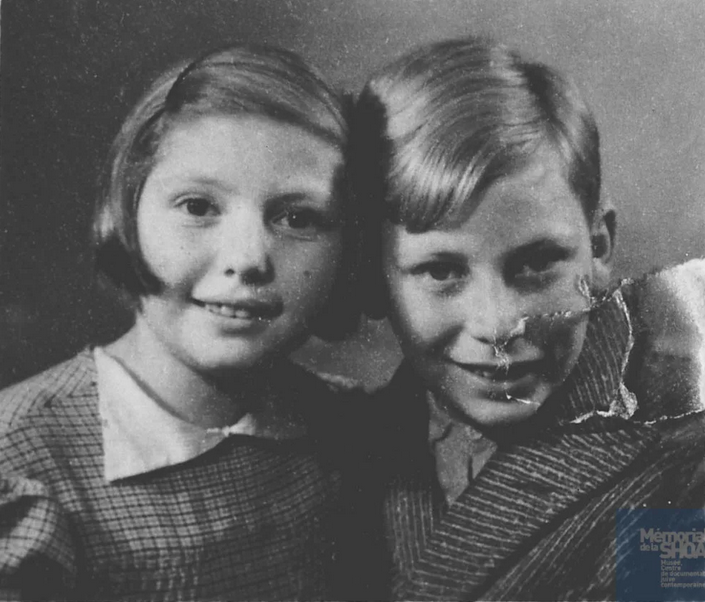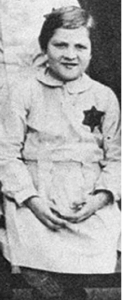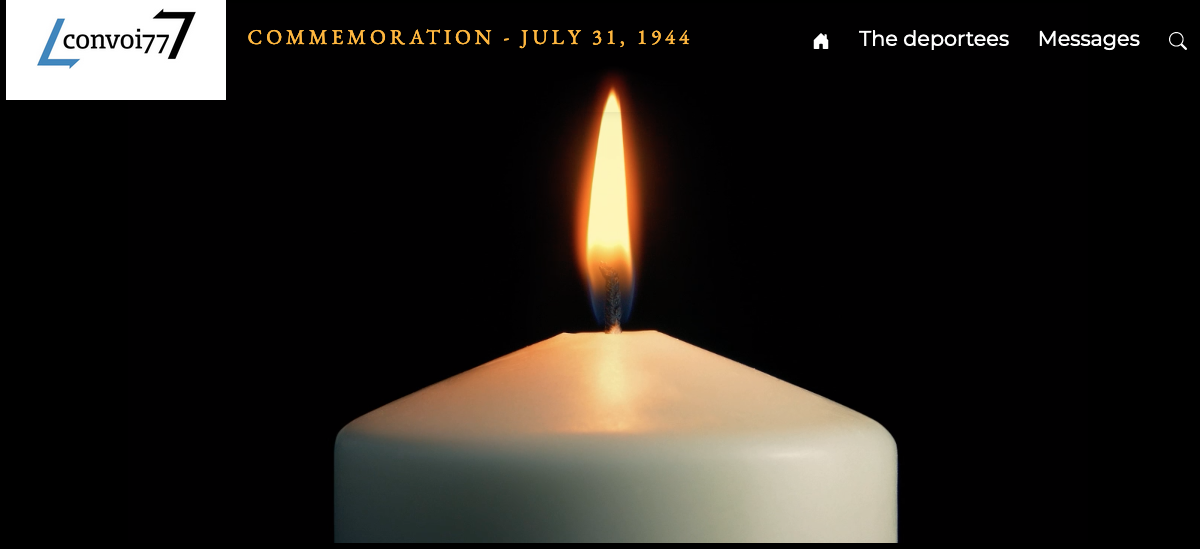Célestine AJZYKOWICZ
Hello, we are Elliot, Stella, Minerva, Lucie, Alannah and Louise from the Blés d’Or secondary school in Bailly-Romainvilliers in the Seine-et-Marne department of France. We are in 9th grade and are working in partnership with the Convoy 77 nonprofit organization, which brings together young people from different countries, Jewish or non-Jewish, believers or atheists, all motivated by the same vision: to better understand and to raise awareness of what became of the 1306 men, women and children who, on July 31, 1944, were deported in cattle cars from Drancy to Auschwitz.
The aim of the Convoy 77 project is to pursue the work of the survivors who testified about their experiences, to pass on the memory of the Holocaust and to combat any type of discrimination and hatred.
As part of our work on this project, we decided to write a fictional autobiography of a young girl, Célestine Ajzykowicz, who was one of the children who were deported on Convoy 77: It supplements the biography her brother, Léon, which was written by another group from our class. We have added some extra information for readers in bold type. We were provided with very few records about Célestine and unfortunately, we were unable to find out much more about her.
My name is Célestine Ajzykowicz. I was born on November 29, 1932 in Yutz, in the Moselle department of France. I had any older brother, Léon, who was born on December 17, 1931. My dad’s name was Guerschlik, known to the French as Henri, and he was born in Poland on February 2, 1902. My mom’s name was Reszka and she was born on May 31, 1909 in Poland. Both were born in the same town: Czestochowicze. I got on really well with my brother.
I lived in Moselle from when I was born until September 1939, when the Second World War began. We moved to Juillaguet in southwestern France that same year, as did a lot of French people who were driven onto the roads during what became known as the exodus. We stayed in a little village. Mom said it was “so they couldn’t find us”. I honestly had no idea who she was talking about, I just knew that a lot of people didn’t like me because I was Jewish. It seemed strange at first, living in a such a small village when I was used to a big town. There were so few people about and hardly any stores – the only place around was a little bakery run by an old lady. Mom said that Léon and I wouldn’t be going to school any more, because we were so clever that there was no point in going anymore.
Some months later, in the middle of the night, we heard people outside. I peeked out the window and saw some men in uniform and thought they must be police officers. Then, all of a sudden, there was a loud noise: they’d broken down the door! They came into the house, dragged our parents out of their room and handcuffed them. Léon and I were left totally shocked by what had just happened. Our mom and dad had been taken away. We were left to our own devices for several days but then one morning a host family came to pick us up and took us to their place. They lived in Bazac, a little village in the Charente department. The village was almost as small as Juillaguet. It was close to the demarcation line, which was the border between the occupied zone in the north of France and the zone in the south. We stayed in there for a while and then one day a lady came to see us. She said we were going to a UGIF children’s home in Paris. I was pleased to be going to Paris, but I wondered how Mum and Dad would manage to find us once we moved away. When I asked, no one would tell me. I was sad that my parents had been taken away and I really hoped they’d be back soon.
On July 20, 1942, Célestine’s father was deported to the Auschwitz concentration camp on Convoy No. 8. On November 4, 1942, her mother too was deported, also to Auschwitz, on Convoy No. 40.
Célestine and her brother, left all alone without their parents, were refugees in a little village. Did they feel lonely or afraid? Perhaps they were looked after by the OSE (a French social welfare organization) or went to stay with a foster family? The village was in the occupied zone, but it’s worth noting that it was close to the demarcation line, so it seems likely that they went there either to try to cross the line, or just to avoid being spotted by the police.
In November 1941, at the request of the Germans, the Vichy government founded an organization called the Union Générale des Israélites de France, or General Union of Jews in France. It was responsible for representing Jews and for social welfare; it paid benefits to households with no income, and financed canteens and hospices, for example. After the roundups in the summer of 1942, the UGIF set up children’s homes in Paris and the surrounding area. These homes took in both “free” children, who had been placed there by their parents or had been “abandoned” for some reason, and so-called “blocked” children, whom the Germans had interned but then released from the camps into the care of the UGIF. Foreign children, or those born to foreign parents, were kept on file and were at risk of being deported at any time. These homes were overseen by the Commissariat Général aux Questions Juives (General Commission for Jewish Affairs) and the Gestapo. Nevertheless, various Jewish and non-Jewish organizations managed to rescue a number of children from these homes and move them to a safe place.
We went with the lady to the UGIF center. When we went inside in the building, there were lots more children like us. Some seemed sad and lonely, but I also saw some girls dancing in the courtyard. I was assigned to room 4 on the second floor. Léon was on the third floor. I cried and howled at the top of my voice; I didn’t want to be separated from Léon. A big girl who must have been about 15 calmed me down; she was one of my roommates. At night, it was stifling; there were about ten of us in the same room and it was very small. Whenever I could, I went to see Léon. We stayed there for two years. It seemed such a long time. Every day, my hope of seeing Mom and Dad again faded a little. Sometimes I chatted with the other girls, but I preferred to be by myself, writing or drawing. An older girl had given me a notebook and a pencil. I was careful not to waste any pages in the notebook due to the rationing.
There are a few records of Célestine and her brother Léon staying in UGIF homes in Paris in 1943. They initially stayed in the Lamarck center and were then moved to the home on rue Secretan.
Overall, things were going okay. Then one day our lives were turned upside down. I had gone to bed as usual. In the middle of the night, I heard noises in the corridors. Léon and the other children who were with us had also got up. We had no idea what was going on; I was scared, I could hear people screaming. Suddenly, a man opened the door of our room. There were lot of men in uniforms, who we soon realized were soldiers. They grabbed us by the arms and dragged us out into the street, then they loaded us into big trucks. I was scared, lots of us were, but I was relieved that Léon was with me. I was scared, and there were a lot of us, but I was a little reassured because Léon was with me. After what seemed a long time, we came to a prison called Drancy.
On the night of July 21-22, 1944, a major round-up took place. A total of 242 children and 33 adults from the UGIF homes in and around Paris were arrested, including 11-year-old Célestine and 13-year-old Léon. The arrests were made at night, to avoid attracting attention and to keep what was happening quiet.
A few days later, we were put on buses and taken to a station. There we were loaded into cattle cars and locked in for hours on end. There were so many of us, I could hardly breathe and I was so thirsty.
Thus they were deported, on July 31, 1944, on Convoy No. 77, the last of the large transports of Jews from Drancy internment camp to the Nazi labor and extermination camp at Auschwitz-Birkenau. The journey was long and tiring, and the travelling conditions were appalling. The deportees were crammed together in cattle cars. Some of them died before the convoy even arrived at the concentration camp.
We got out of the train onto some sort of a platform, and all we could see was lots of German soldiers. In the distance, there was a lot of smoke, which smelled really bad. I had no idea what it was, I’d never smelled anything like that before. We followed along with everyone else. Then the soldiers asked how old we were, and they let me go the same way as my brother, which made me feel better. And then a bit later, they said we were going to take a shower…
They were going through the selection process on the platform, during which people were either deemed to be fit for forced labor or not. Children were therefore immediately sent to their deaths. Célestine and her brother were murdered in the gas chambers as soon as they arrived at the camp. This convoy included a large number of young children, 324 in all.
We have no record of any family members having made inquiries about them: this can be explained by the fact that the entire Ajzykowicz family died.
According to French law, if there was no further news of them, deportees were deemed to have died five days after they were deported. They were therefore declared to have died on August 5, 1944.
Xavier Messalati submitted a testimonial form on the Yad Vashem. He is a registered on Geneanet, a genealogical website on which users can search for their ancestors, as a historian.
We also found some material posted online by Serge Klarsfeld.


 Français
Français Polski
Polski










